 Petzlover
Petzlover American English Coonhound is originated from United States but Elo is originated from Germany. American English Coonhound may grow 9 cm / 4 inches higher than Elo. American English Coonhound may weigh 8 kg / 17 pounds lesser than Elo. American English Coonhound may live 4 years less than Elo. American English Coonhound may have more litter size than Elo. American English Coonhound requires Low Maintenance. But Elo requires Moderate Maintenance
American English Coonhound is originated from United States but Elo is originated from Germany. American English Coonhound may grow 9 cm / 4 inches higher than Elo. American English Coonhound may weigh 8 kg / 17 pounds lesser than Elo. American English Coonhound may live 4 years less than Elo. American English Coonhound may have more litter size than Elo. American English Coonhound requires Low Maintenance. But Elo requires Moderate Maintenance
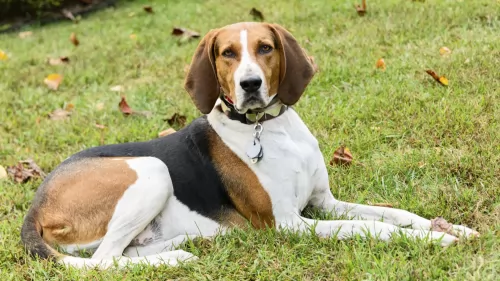 The American English Coonhound was developed in the Southern part of the United States from the variety of English hunting dogs that came to the States with the early settlers. At one point they were known as the Virginia Hound. This breed is well known for its prowess in hunting raccoons and her endurance and speed. Of course as a hound dog he loves to howl during the hunt and at home with the family. He can be frustrated and destructive if his energy and need for a job are not satisfied.
The American English Coonhound was developed in the Southern part of the United States from the variety of English hunting dogs that came to the States with the early settlers. At one point they were known as the Virginia Hound. This breed is well known for its prowess in hunting raccoons and her endurance and speed. Of course as a hound dog he loves to howl during the hunt and at home with the family. He can be frustrated and destructive if his energy and need for a job are not satisfied.
 Developed in Germany in 1987, the Elo is a fairly new breed and there are some unique situations surrounding its development. For one thing the Elo Breeding and Research Association has trademarked the breed name, Elo. The use of the name is supervised by the Elo Breeding and Research Association. Secondly, the goal in developing the Elo is the make the best possible pet for a family. The Elo is bred for behaviors rather than appearances, for companionship rather than work.
Developed in Germany in 1987, the Elo is a fairly new breed and there are some unique situations surrounding its development. For one thing the Elo Breeding and Research Association has trademarked the breed name, Elo. The use of the name is supervised by the Elo Breeding and Research Association. Secondly, the goal in developing the Elo is the make the best possible pet for a family. The Elo is bred for behaviors rather than appearances, for companionship rather than work.
The Elo was developed when Marita and Heinz Stories crossed Old English Sheepdogs (Bobtails) with their Eurasiers. They believed that these two breeds were similar in type and development. They were looking to breed a great household pet. The litters from these original crosses were then bred again with Eurasiers or Chow, Dalmatians, and Samoyeds. This expanded the donor base and they continued to breed for character using just the Eurasier, Chow and Bobtail (Old English Sheepdog). Currently there are about 3000 dogs and 60 breeders of Elos. The breed is not really known outside of Germany but that is slowly changing.
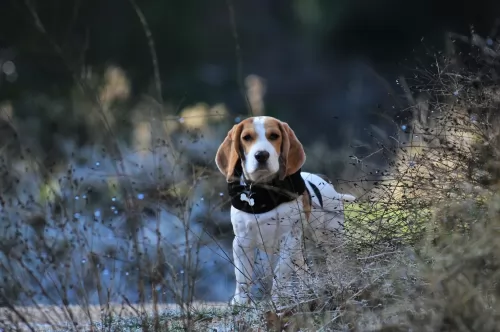 The American English Coonhound is an athlete with a deep chest and cute face. They have broad heads, domed skulls, dark eyes and soft, low ears. They are as fast and athletic as they look. These are highly athletic dogs with long legs and a slim but muscular body. They are so well built for their hunting role, that any deficiencies are quickly identified and bred out of the breed.
The American English Coonhound is an athlete with a deep chest and cute face. They have broad heads, domed skulls, dark eyes and soft, low ears. They are as fast and athletic as they look. These are highly athletic dogs with long legs and a slim but muscular body. They are so well built for their hunting role, that any deficiencies are quickly identified and bred out of the breed.
 As previously mentioned the Elo is bred for behaviors not appearance and not work. Therefore, the appearance of any one dog can vary greatly. There is a breed standard but there is also a lot of diversity in the breed. The Elos’ body is longer than it is tall and it tail is full and furry. He carries his tail over his back in a curve. The Elo has furry, slightly rounded, wide set ears. The undercoat is dense, and the top coat length can be medium or short.
As previously mentioned the Elo is bred for behaviors not appearance and not work. Therefore, the appearance of any one dog can vary greatly. There is a breed standard but there is also a lot of diversity in the breed. The Elos’ body is longer than it is tall and it tail is full and furry. He carries his tail over his back in a curve. The Elo has furry, slightly rounded, wide set ears. The undercoat is dense, and the top coat length can be medium or short.
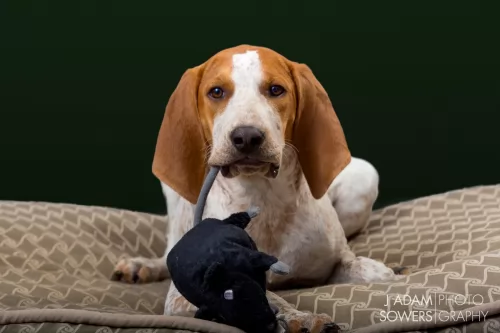 The American English Coonhound knows how to relax just as much as he knows how to work. He is mellow after work and tenacious in the chase. This is not the dog for a first-time owner. They are stubborn and hard to train. They howl and bark at home as much as they do on the hunt. They need a strong pack leader, especially when living in the city or neighborhoods.
The American English Coonhound knows how to relax just as much as he knows how to work. He is mellow after work and tenacious in the chase. This is not the dog for a first-time owner. They are stubborn and hard to train. They howl and bark at home as much as they do on the hunt. They need a strong pack leader, especially when living in the city or neighborhoods.
They are outgoing and friendly and very sensitive. They mature later than most other breeds their size. They are about 2 when they mature.
 Having been bred to be a companion animal, the Elo loves children, is loyal, playful, obedient and calm. They love to and need to be with their people. These are not independent, think on their own dogs. They depend on their people in order to be happy and well behaved. He is outgoing and friendly with people.
Having been bred to be a companion animal, the Elo loves children, is loyal, playful, obedient and calm. They love to and need to be with their people. These are not independent, think on their own dogs. They depend on their people in order to be happy and well behaved. He is outgoing and friendly with people.
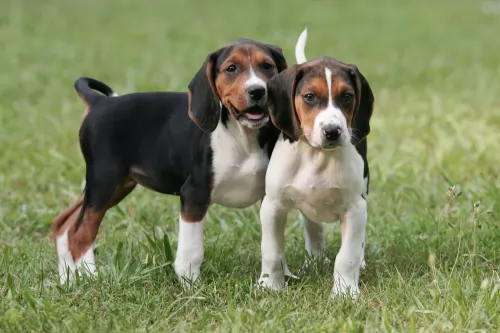 If kept active and happy, the American English Coonhound has very few health problems. The benefit from a large gen pool but do have some health concerns including elbow and hip dysplasia, ear infections, cataracts, bloat, and Progressive Retinal Atrophy. They do have a tendency to gain weight as they age. These issues will be addressed in more detail below. DNA testing is available for the dysplasia and eye issues.
If kept active and happy, the American English Coonhound has very few health problems. The benefit from a large gen pool but do have some health concerns including elbow and hip dysplasia, ear infections, cataracts, bloat, and Progressive Retinal Atrophy. They do have a tendency to gain weight as they age. These issues will be addressed in more detail below. DNA testing is available for the dysplasia and eye issues.
 At this point in time the Elo breed is very young and has a very small population, so the breeding group is small and probably inbred. This can lead to hereditary diseases and the Elo is not immune. However, they are a healthy breed and it seems the major issue is Disticha – an eye disease that causes corneal damage. It causes corneal ulcers, inflammation, scarring and tearing. There are a variety of treatments including surgery
At this point in time the Elo breed is very young and has a very small population, so the breeding group is small and probably inbred. This can lead to hereditary diseases and the Elo is not immune. However, they are a healthy breed and it seems the major issue is Disticha – an eye disease that causes corneal damage. It causes corneal ulcers, inflammation, scarring and tearing. There are a variety of treatments including surgery
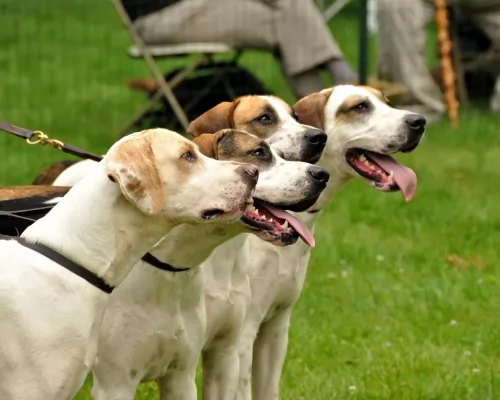 your working American English Coonhound needs different food than one who is not working. So, if you hunt with your dog remember he really needs the calories to keep his energy up. However, they can get obese as they age so cut back with less activity and more years. Watch the number of treats when training.
your working American English Coonhound needs different food than one who is not working. So, if you hunt with your dog remember he really needs the calories to keep his energy up. However, they can get obese as they age so cut back with less activity and more years. Watch the number of treats when training.
Elbow and Hip Dysplasia – the joint issues prevent the bones from connecting and functioning properly. Any good breeder of American English Coonhounds will do tests for both.
Eye issues range from cataracts to PRA (Progressive Retinal Atrophy) Again there are tests available for these conditions.
Bloat is a condition many medium to large size dogs can experience when their stomach can become inverted and intestines distended. The is a situational issue and can’t be predicted. Don’t allow your coonhound to wolf down food right before exercise and feed him more than once a day in a smaller meal.
The American English Coonhound needs a lot of exercise and has an extremely strong work and prey drive.
 The Elo is a non-working family dog so do not over feed them. Use a high quality dry food made for a medium size dog.
The Elo is a non-working family dog so do not over feed them. Use a high quality dry food made for a medium size dog.
As mentioned previously the Elo breed is so young as a breed that there have been very few health studies and the only inherited issue at this time besides the Disticha.
Even though the Elo is a non-working dog, they do require a substantial amount of exercise daily. They need outdoors space to run and play as they are very playful with their family. He loves to go on walks, to run, play and dig. Yes, he can be a digger if he is not provided with appropriate and alternative exercise. Without exercise the Elo can be irritable and display behavior issues.